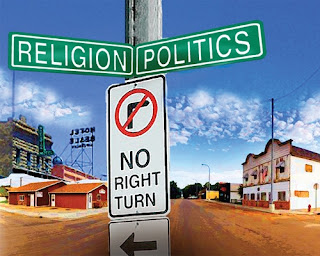 |
| Religion And Politics |
George Washington never mentions the name of Jesus Christ once in all of his diaries and letters and according to his diaries he rarely attended church. He did say to the United Baptist Churches in Virginia in May 1789 that every man “ought to be protected in worshipping the Deity according to the dictates of his own conscience.” Washington didn’t say everyone should worship God and Jesus Christ, he says that everyone should worship the Deity according to the dictats of his own conscience. Washington believed we should follow what we think is right, not what religious leaders think is right. Thomas Jefferson was a staunch believer of science over religion. He did not believe in spiritual souls, angels or godly miracles. Jefferson did however admire the morality of Jesus, Jefferson did not think him divine, nor did he believe in the Trinity or the miracles of Jesus. In a letter to Peter Carr, 10 August 1787, he wrote, “Question with boldness even the existence of a god.” Jefferson believed in materialism, reason, and science. He never admitted to any religion but his own. In a letter to Ezra Stiles Ely, 25 June 1819, he wrote, “You say you are a Calvinist. I am not. I am of a sect by myself, as far as I know.” Jefferson went on to create the Jefferson bible where he took a razor and removed sections of his bible that contained the miracles of Jesus. John Adams wrote in “A Defense of the Constitutions of Government of the United States of America” [1787-1788] “The United States of America have exhibited, perhaps, the first example of governments erected on the simple principles of nature; and if men are now sufficiently enlightened to disabuse themselves of artifice, imposture, hypocrisy, and superstition, they will consider this event as an era in their history. Although the detail of the formation of the American governments is at present little known or regarded either in Europe or in America, it may hereafter become an object of curiosity. It will never be pretended that any persons employed in that service had interviews with the gods, or were in any degree under the influence of Heaven, more than those at work upon ships or houses, or laboring in merchandise or agriculture; it will forever be acknowledged that these governments were contrived merely by the use of reason and the senses. . . Thirteen governments [of the original states] thus founded on the natural authority of the people alone, without a pretence of miracle or mystery, and which are destined to spread over the northern part of that whole quarter of the globe, are a great point gained in favor of the rights of mankind.” James Madison wrote “During almost fifteen centuries has the legal establishment of Christianity been on trial. What have been its fruits? More or less in all places, pride and indolence in the Clergy, ignorance and servility in the laity; in both, superstition, bigotry and persecution. What influence, in fact, have ecclesiastical establishments had on society? In some instances they have been seen to erect a spiritual tyranny on the ruins of the civil authority; on many instances they have been seen upholding the thrones of political tyranny; in no instance have they been the guardians of the liberties of the people. Rulers who wish to subvert the public liberty may have found an established clergy convenient auxiliaries. A just government, instituted to secure and perpetuate it, needs them not.” Benjamin Franklin wrote in his autobiography “My parents had given me betimes religions impressions, and I received from my infancy a pious education in the principles of Calvinism. But scarcely was I arrived at fifteen years of age, when, after having doubted in turn of different tenets, according as I found them combated in the different books that I read, I began to doubt of Revelation itself.” One of the strongest arguments for separation of church and state that we never hear about is the The Treaty of Tripoli.
In 1797 President Adams submitted a treaty with Tripoli, which was a muslim state, to the United States Senate. The treaty said in Article 11 “As the Government of the United States of America is not, in any sense, founded on the Christian religion; as it has in itself no character of enmity against the laws, religion, or tranquility, of Mussulmen; and, as the said States never entered into any war, or act of hostility against any Mahometan nation, it is declared by the parties, that no pretext arising from religious opinions, shall ever produce an interruption of the harmony existing between the two countrys”. The Senate unanimously ratified the treaty. The Government of the United Stats is not, in any sense, founded on the Christian religion.
I’ve heard over and over again that this country needs to return to its religious roots and the way the founding fathers wanted it. I agree, but not in the same context that I normally hear that argument. I agree that we should return to our religious roots which is freedom of religion to worship who we want, worship where we want, worship when we want, or choose not to worship at all. The founding fathers did not shape a country based on the christian faith, the founding fathers shaped a country on freedom of religion for everyone, not just the conservative christian right.

.gif)




0 comments:
Post a Comment